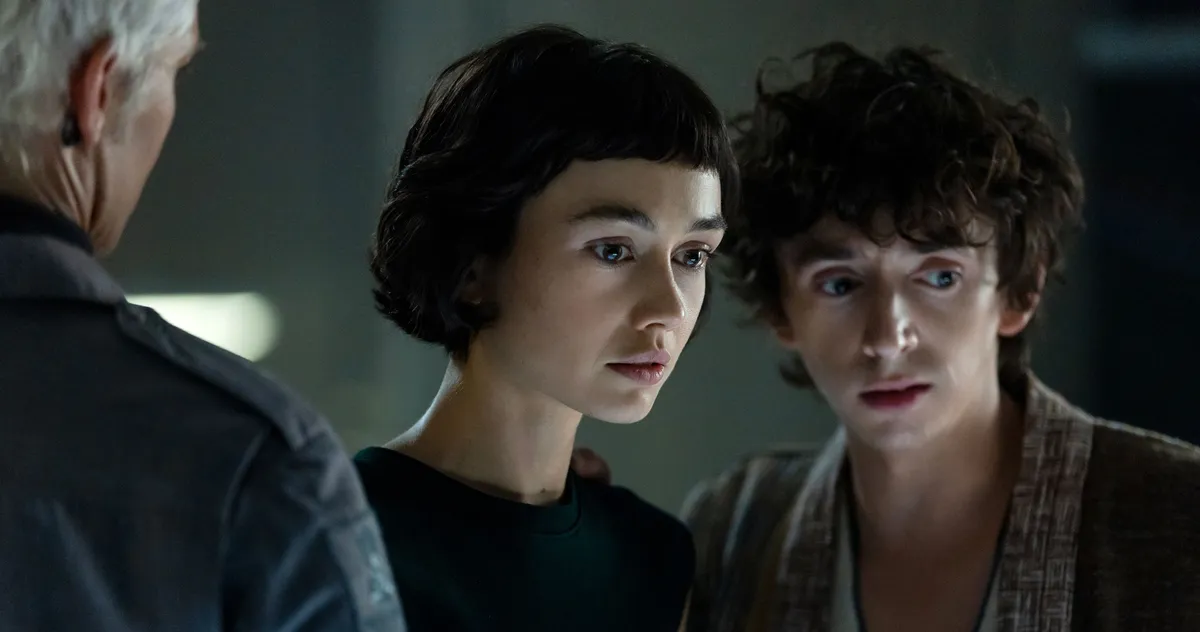
When we think of the Alien franchise and its corner of space (where no one can hear you scream), we tend to think of the movies. These range from bona fide horror classics to action-adventure thrillers to bizarre deep dives into Alien lore to, well, Alien vs Predator: Requiem. However, extraterrestrial lifeforms have been popping out of chests in places outside the movie theater, and you’d be missing out if you didn’t explore the potential Alien has in other mediums. So, like an unlucky space cowboy staring over an oddly pulsating egg, why not check out what the Xenomorph has been up to in …
The Best Alien Comics
.
Aliens: Salvation (1993)
Dark Horse Comics arose in the late ’80s and not only did it quickly amass a stable of licensed titles like Star Wars, but it became notable as a place where creators could let their hair down a bit. As such, Alien, which has always thrived by giving its various creators leeway to go bananas, was a perfect IP for its ranks. And Aliens: Salvation, the story of a religious crewman and his captain forced to survive on a mysterious planet after their ship is infested by Xenomorphs, is a great example of the exhilarating storytelling that came from this match.
Penciled by Hellboy’s Mike Mignola and written by Watchmen artist and co-creator Dave Gibbons, Salvation doesn’t reinvent the wheel, but it does operate on a level of psychological horror that elevates it above a typical “monster gone loose” tale. Mignola, now famous for the atmosphere and haunting shadow work that he’d implement on Hellboy, embellishes the tale with a sense of escalating delirium, turning it quickly from interstellar adventure to survivalist nightmare. And the ending is total, fiery hell. Fitting, really.
.
Aliens: Labyrinth (1995)
To put it bluntly, Alien can be downbeat material. It’s hard to find an entry that really leaves you feeling good at the end, and Aliens: Labyrinth takes that maxim to one of its furthest reaches by introducing the demented Dr. Church, a military professional that obsesses over the inner-workings of the Xenomorph, trying to learn how to defeat it and control it. There are peripheral characters, particularly Crespi, the man sent to investigate Church’s demented operations, but Labyrinth is effectively a one-man show, and it’s all the better for it.
Labyrinth takes visual delight in both relentless horror (one issue is devoted to Church getting stuck in an alien hive and it’s one of the most troubling things in the entire franchise) and the oddly morbid mundanity of running a Xenomorph research lab. Jim Woodring, famous for his comic book surrealism, is the perfect writer to dive into Church’s increasing instability, especially as the reader gets nestled in with him. And Kilian Plunkett, still very new to comics when hired to draw Labyrinth, fills the panels with every gory detail. Xenomorphs have rarely looked better.
.
Aliens: Dead Orbit (2017)
James Stokoe is no stranger to creating comics that serve as both refreshing additions and fitting tributes to long-running franchises. His Godzilla: The Half-Century War might be the best Godzilla comic ever published. And while Aliens: Dead Orbit won’t surprise you with its plot (a lonely ship crew has to survive a Xenomorph attack while the clock ticks toward possible destruction), its harrowing artwork makes it a must-have for Alien fans. Like Stokoe adored the iconography of, say, Godzilla rising from the flames of a ruined city, he’s also obviously a fan of the many Alien moments that have become cinema staples. That is to say, Stokoe is not afraid of giving you a good chest-bursting.
However, a more traditional Alien story doesn’t automatically render Dead Orbit as old hat. The two Alien entries of the 2010s, Prometheus and Alien: Covenant, showed off director Ridley Scott and his collaborators’ attempts to expand the mythology of the Alien universe and test out its maximum capacity for lore and themes of creation and existentialism. Dead Orbit’s return to the familiar “haunted house” tale reminds one of what made Alien so potent in the first place.
The Best Alien Video Games
.
Alien vs. Predator (1994)
Though it began as a comic book and eventually became a film, Alien vs. Predator reached its zenith as a widely acclaimed arcade beat-’em-up. The 1994 Alien vs. Predator eschews the horror atmosphere of the Alien films and delivers round after round of explosive action. There are four playable characters: two different Predator types, a cyborg woman with a katana, and Major Dutch Schaeffer, the protagonist from the first Predator film with an artistic likeness that is just on the cusp of getting the game sued by Arnold Schwarzenegger. Their mission? Rescue California (and then any other place that needs it) from Xenomorphs.
Regularly ranked among the best arcade and beat-’em-up games of all time, Alien vs. Predator is button-mashing heaven. Defeated enemies regularly drop weapons, meaning that you and your friends are often scrambling for grenade launchers, flamethrowers, and various blades. Strategy is nowhere to be found in the wholesale slaughter, showing that it doesn’t necessarily matter if the genre of the Alien franchise changes. It just matters if the genre is done well.
.
Aliens: Infestation (2011)
One of the most famous series to take inspiration from the Alien films is Metroid, Nintendo’s alien-blasting series about Samus Aran and her many, many interplanetary missions. So it’s only right that one day we’d get a truly fantastic Alien game in the “Metroidvania” style, preferably on a Nintendo console. Aliens: Infestation is that game, an exciting and surprisingly moody little adventure for the Nintendo DS that takes a team of space marines into various ships and planets to deal with the more … aggressive lifeforms inside. Featuring a “perma-death” system that means that when a particular marine is killed, they’re gone for good, Aliens: Infestation is more intense than its spot on a little handheld would imply.
More than its relationship to its big-budget cousin would imply as well. Aliens: Infestation was developed alongside Aliens: Colonial Marines, with the latter coming to the bigger home consoles like PlayStation 3 and Xbox 360. It was an ultimately shallow experience, with most of the blame being pointed at the fact that bad artificial intelligence made hunting Xenomorphs barely tougher than target practice. Infestation, on the other hand, grasped the stakes, and the game has become an undersung classic of the DS library.
.
Alien: Isolation (2014)
The 1979 Alien, in particular, seems hard to turn into an effective video game. With its single Xenomorph antagonist, its cramped environment, and its fairly helpless cast of characters, a video-game adaptation sounds like an exercise in pure dourness. Luckily, Alien: Isolation managed to capture that particular cocktail in a way never before done in video games. You play as Amanda Ripley, daughter of Sigourney Weaver’s Ellen from the first film, who seeks to figure out what happened to her mother and ends up trapped on a doomed space station. Stuck aboard with her is a Xenomorph that stalks you for most of the game.
Alien: Isolation alternates between frantic mad dashes to safety and cautious stealth. When it does allow you to defend yourself, such as when you have to make it past some malfunctioning androids, it’s solely to buy yourself time. The same goes for the ways in which you can momentarily distract or hold off the Xenomorph, and just like her mother, Amanda discovers that there is no defeating the monster — just escaping it. If there is one video game that’s worthy of Alien, it’s Isolation.
The Best Alien Fan Film
.
Batman: Dead End (2003)
Fan films existed before the internet, but thanks to the ability to upload and share videos online, they gained newfound prominence there. And perhaps the most famous fan film of the early aughts was Batman: Dead End, which not only gained widespread exposure thanks to its impressive cinematography and comic-book-friendly Batman costume and Joker makeup, but from the fact that it crossed over with both Alien and Predator (which Batman had previously done separately in comics, but never before onscreen).
Dead End premiered at San Diego Comic-Con in 2003, an astounding debut for such a legal nightmare. In retrospect, it’s hard not to admire just how confident director Sandy Collora is with his work. He cuts no corners in showing how much time he’s spent on dressing up the actors and his Xenomorph, a truly impressive costume for a short film that allegedly cost $30,000, is on full display. As an expression of pure geekdom, Batman: Dead End has yet to be topped.
The Best Alien Novels
.
Alien (1979)
Novelizations of films aren’t uncommon, but they rarely follow the movie exactly (often, they’re adapting the script rather than the film itself, with the included details typically being bits left on the cutting-room floor). Movie-novelization king Alan Dean Foster (who also penned Splinter of the Mind’s Eye, the Star Wars follow-up that George Lucas requested in case the movie was a flop) wrote the book for Alien. And while it’s not as purely effective as the film, it’s simultaneously more pulpy in its horror while also being oddly faithful to the original H.R. Giger designs for the alien.
The novelization lacks some of the mysterious elements of the film; the massive “pilot” in the derelict ship is nowhere to be found, which takes away some of its speculative mythology. In its place, though, are things that almost harken to the “creature feature” sci-fi films that came before Alien. The “facehugger” is equipped with a huge eyeball, the chestburster is a fully formed little monster, and when the alien does hunt its prey, it kills with its hands. And when the surviving crew interrogates the android Ash about his treachery, the book has him pretty much spill the space beans. The novel is Alien in pure monster-movie form.
.
Alien: The Cold Forge (2018)
The secretive acts of Weyland-Yutani, the megacorporation that is apparently involved in everything in the universe, has fueled countless Alien stories. However, even they are susceptible to betrayal and espionage on multiple levels, and Alien: The Cold Forge is centered around this deception. Doctor Blue Marsalis, a disabled, brilliant WY scientist, is ordered to research Xenomorphs in order to potentially use them (or aspects of them) as weapons. But Marsalis aims to instead study their regenerative, evolving anatomy in order to potentially create medicine from them — and perhaps a cure for her own condition.
Marsalis is an interesting protagonist and author Alex White makes the most of Marsalis’s ability to control “synthetics,” among other things. However, she is faced with one of the greatest human villains in Alien history: Dorian Sudler. A higher-up at WY, Sudler is pure greed and anger, and is arguably even less human than the Xenomorphs themselves. Usually Alien stories are quests to outlast the titular monsters, but by the time Sudler bites it (or, well, gets bitten himself), it’s immensely satisfying. With friends like those, who needs aliens?
.
Aliens: Phalanx (2020)
Recent Predator installments like Prey and Killer of Killers have effectively revived the franchise by delivering stark survival/action thrillers in period-piece trappings. Alien hasn’t quite made the same transition onscreen, but if you’d like a taste of an Alien sequel that throws us way back in time, read Aliens: Phalanx. Set in a medieval world far away from any familiar pieces of Alien lore (Weyland-Yutani is nowhere to be found, and neither are any androids or spacecraft), it concerns a pocket of human survivors who live in a world infested by Xenomorphs.
But in the place of established Alien mythology, Phalanx creates its own. These people, raised in an unforgiving place, have no need for any of our Alien jargon. They call the Xenomorphs “demons” and the little knowledge they have of them is passed down through their own folklore. From the onset, Phalanx is a tale that upends our own familiarity with the Xenomorph by resetting the stakes involved in understanding and combatting them. And it makes a good case for extending modern Alien plotlines beyond “Here’s some references to the original film but in a new location.”
The Best (Only) Alien TV Series
.
Alien: Earth (2025)
From the beginning, it’s clear that Alien: Earth wants to take some big thematic swings to go along with its Xenomorph-induced terror. Featuring a story about mankind’s relationship to technology and how that changes our connections to identity — an evolution that comes to feel as important to the show as the Xenomorph’s own transformations — Earth’s lofty goals make it a compelling watch even when it falls short of its own intended profundities. It also can’t help but draw from some of the franchise’s greatest hits, with one episode in particular feeling like a remake of the 1979 film for the 2025 small screen.
That said, Alien: Earth doesn’t disappoint as the franchise’s first televised series. Noah Hawley, previously the creator of the underrated Legion and the perfectly rated Fargo, and his team do their best work not when they’re reaching for the stars for a message but when they ground the show in chaos, suspense, and even sometimes humanity. Alien is no stranger to metaphor and interpretation, but Earth shows on a weekly basis why it’s also been stunning entertainment for nearly 50 years.
The Best Alien Audio Drama
Alien 3 (2019)
Before Alien 3 was ever turned into one of the most controversial films in the entire series, its producers asked cyberpunk author William Gibson to write a draft of the script. The results are a famous Hollywood “what could’ve been,” with Gibson’s story being both heavy on the action and keen on exploring some of the lore that the series had built so far, such as Xenomorph science (the script has a lot to say specifically about their breeding.) Gibson ended up being replaced and his script lay untouched for decades.
And then, in a one-two punch revival, Gibson’s screenplay was both turned into a comic and adapted into an audio drama. The former is solid, but the latter, featuring actors Lance Henriksen and Michael Biehn returning to their roles as fan-favorite characters Bishop and Hicks, respectively, is curious and delightful. And though the story does sideline Ellen Ripley, it’s fun to see whether Gibson’s work would’ve held weight in (almost) theatrical form. For Alien devotees, it’s a treasure.



